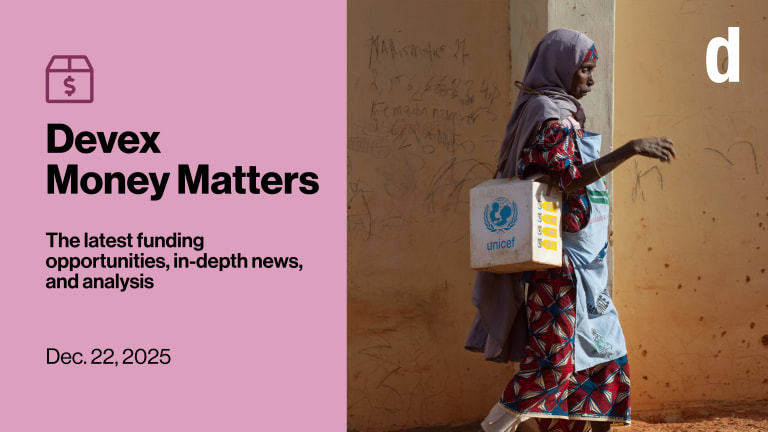
SAN FRANCISCO — When the value of the XRP cryptocurrency skyrocketed, so did the assets of Rippleworks, a nonprofit foundation with an endowment based on cryptocurrency.
Rippleworks launched four years ago with a mission to help social ventures to scale, primarily by pairing business and technology experts with social enterprises based in emerging markets. A personal donation from Chris Larsen, co-founder and executive chairman of Ripple — a company that leverages blockchain technology to send money around the world — kicked off the effort.
“We may be a funder, but we’re an entrepreneur-first funder.”
— Doug Galen, co-founder and CEO, RippleworksThe value of XRP grew from next to nothing in 2015 to the second largest cryptocurrency after Bitcoin — growing by over 30,000 % in 2017. The jump prompted the foundation’s co-founders to think bigger.
Rippleworks funds its operations by converting a tiny fraction of its XRP into dollars. And with new resources at its disposal, the foundation saw an opportunity to build on its work in human capital by expanding into financial capital. Doug Galen, co-founder and CEO of Rippleworks, expanded on the thinking behind this shift in a meeting with Devex at its offices in Redwood City, California.
With assets now valued at $370 million, the organization has stayed true to its focus on supporting entrepreneurs as it transitions from operator to funder, Galen told Devex
A crypto-powered foundation
Galen and Larsen, who built the online lender E-Loan together, are both interested in broadening the perspectives of Silicon Valley executives who might otherwise be detached from ways to make an impact on the rest of the world.
Nonprofits explore the newest fundraising frontier: Cryptocurrency
UNICEF can now receive, hold, and disburse digital currency built on blockchain technology — and nonprofits are taking note. Those considering cryptocurrency fundraising can learn from early adopters on which currencies to accept and whether to hold or convert donations.
After Galen talked with a range of experts from the world of social entrepreneurship, philanthropy, and impact investing, he arrived at a model that pairs executives from leading tech companies with social enterprises based in emerging markets. For example, the chief security officer at Slack, a company that builds collaboration software tools, worked with M-Kopa, a Kenyan solar energy company, to strengthen its data security. Then, as the value of XRP went up, Galen and Larsen discussed how the foundation could provide new forms of support, including funding.
“We had some idea that those resources could turn into more resources,” Larsen said, who is now a billionaire thanks to the value of XRP, which like other cryptocurrencies has seen a lot of volatility over the years.
The only problem was, the foundation was not yet set up as a funder. Rippleworks could have met the 5% minimum distribution required of private foundations in the United States by putting its money into a donor-advised fund, vehicles for philanthropy, which does not have to distribute those funds to nonprofits. But instead, the foundation worked to develop its approach to funding in consultation with other entrepreneurs.
A pro-entrepreneur investment approach
Galen and his team organized dinners with CEOs and fundraisers to ask: Who are the best and worst funders? What makes them that way? And what might it look like to build a foundation from the ground up with a focus on supporting entrepreneurs?
The foundation drew on that feedback to design its pipeline, diligence, and funding process.
Now, Rippleworks supports entrepreneurs with debt, equity, and grants. One of its early investments supported Kiva Protocol, a digital identification system that is using blockchain to provide access to financial services in Sierra Leone, with a $5 million convertible grant that will convert to equity if Kiva decides to go with a for-profit structure. Because the foundation trades into dollars, it funds in dollars, not XRP.
The foundation has been co-investing with other funders in debt and equity deals in order to use its capital as a “bridge to somewhere” or as a way to “crowd in other funders,” Galen said.
“Where can we be catalytic? Where do we see the gaps? And what is the right role for foundation dollars?” said Ayesha Wagle, head of investments at Rippleworks.
Wagle, former president at Komaza, an organization that partners with smallholder farmers in Africa to plant tree farms, came into the organization sensitive to the power dynamics between those who have money and those who are asking for money, she told Devex.
At Rippleworks, Wagle suddenly had capital that was flexible, geography and sector agnostic, and entrepreneur-friendly — news that traveled quickly among social entrepreneurs.
“I had heard that Rippleworks had to get money out really fast, so I reached out really fast,” said Anushka Ratnayake, CEO of MyAgro, a social enterprise that developed a mobile layaway system for smallholder farmers.
As Germany grows into its role as an aid leader, its development finance institutions are evolving.
Ratnayake had just gotten its first large government grant from KfW, the German development bank, “But the deal almost fell apart when they saw our balance sheet,” she said.
Without a reserve, government donors would not be comfortable funding MyAgro, Ratnayake said, because they feared the social enterprise would not be able to withstand an unexpected event, such as a grant coming in late.
Rippleworks awarded MyAgro with a grant of $3 million and a loan of $1.5 million.
Ratnayake said she appreciates how Rippleworks began by asking her what she needed, used materials she had created before for other donors, then worked quickly to get this money out the door on a timeframe that worked for MyAgro.
“We said: ‘Dream big. Forget what other funders say. What do you actually need instead of tailoring your ask to somebody?’” Wagle said, reflecting on her conversation with Ratnayake. “I felt like I got to be the funder I wanted to talk to when I was raising money.”
From one-to-one to one-to-many
After several years refining its model pairing experts with projects in emerging markets, Rippleworks wanted to do more to address what it sees as a human capital crisis facing social enterprises.
With the rise of the price of XRP, and the growth of the Rippleworks endowment, the foundation now holds in-person convenings to serve more people, Galen explained. These workshops draw on and teach from the same frameworks that Rippleworks experts have used in projects with social enterprises over the years.
“Our philosophy is: identify a critical problem, get in, solve it, have an endpoint, transfer knowledge, keep in touch,” Galen said.
For example, the foundation recently hosted a convening in Sao Paolo, Brazil with Flourish, an initiative that spun out of the Omidyar Network with a focus on investing in financial inclusion.
Within 10 weeks of each convening, Rippleworks reaches back out to participants, and their goal is to have more than 60% of them rank the experience a 5 out of 5 with plans underway or in the works to implement what they learned.
While the Rippleworks model has expanded far more quickly than most foundations experience, Galen wants to make sure the organization stays true to its initial mission.
“I want to make sure we never lose our pro entrepreneur DNA,” Galen said. “We are former entrepreneurs. We are about entrepreneurs. And we may be a funder, but we’re an entrepreneur-first funder.”








